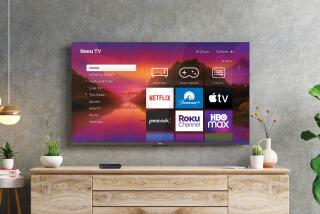How Amazon Fire TV stacks up against competitors
Amazon.com on Wednesday jumped into the crowded world of video-streaming devices by announcing the Fire TV, a $99 set-top box.
The Amazon Fire TV will now go head to head against the Apple TV, the Google Chromecast and four Roku devices. These devices allow users to stream video and audio content from the Internet onto TV sets with HDMI ports.
Hereâs how the four companyâs stack up in various areas:
Streaming capabilities
When video-streaming devices first came out a few years ago, not all of them could stream video at 1080p HD, but that is no longer the case. The products from all four of these companies are capable of streaming video at a full HD resolution.
Users without HD TVs can also buy the Roku 1 and 2 and can connect using analog RCA cables to stream content at 480p quality.
Pricing and availability
The Amazon Fire TV is the latest device to be announced, but it went on sale immediately for $99 through Amazonâs website. Staples has said that it will carry the gadget at its stores starting April 27.
The Apple TV has been on sale for years, online and in stores, and also retails for $99.
Chromecast went on sale last year, and is available online and in stores for $35. It is the cheapest video-streaming device that is available from these four companies.
Rokuâs products range in price from $49.99 to $99.99. Both the Roku Streaming Stick and the Roku 1 are available for $49.99, the Roku 2 costs $79.99 and the Roku 3 goes for $99.99.
Size
The Amazon Fire TV is a black, square set-top box that measures 4.5 inches by 4.5 inches. It is 0.7-inches tall and it weighs 0.62 pounds.
The Apple TV is also a box, but is more rounded and looks a lot like a hockey puck. The device measures 3.9 by 3.9 inches and is 0.9 inches tall. It weighs 0.6 pounds.
The Chromecast is a small dongle that plugs into the back of the TV. It is among the smallest devices on this list, measuring 2.83 by 1.38 inches and is 0.47 inches tall. It weighs 0.07 pounds.
Rokuâs gadgets range in size. The Streaming Stick is similar to Chromecast and is also a dongle. It measures 3.1 by 1.1 inches and is 0.5 inches tall. It weighs 0.04 pounds.
The Roku 1, 2 and 3 are set-top boxes and are more similar in size to the Amazon Fire TV and the Apple TV. The Roku 1 and 2 both measure 3.7 by 3.7 inches and are 1.2 inches tall. They weigh 0.22 pounds.
The Roku 3 is slightly smaller but a little heavier. It measures 3.5 by 3.5 inches and is 1 inch tall, but it weighs 0.31 pounds.
Channels
When it comes to video and audio content, each device has a large selection, but most of the devices have one or two content providers that are glaringly missing.
All the devices play content from Netflix, Hulu Plus, YouTube and Pandora, but they start to differ after that.
The Fire TV supports a few dozen channels, including Amazon Instant Video, WatchESPN and NBA Game Time, but it is glaringly missing HBO GO. It also lacks support for Spotify, Rdio, MLB.TV and NHL GameCenter.
The Apple TV also plays a couple dozen channels. It can also play content from usersâ iTunes library and audio from iTunes Radio. HBO GO is supported, as are WatchESPN, NBA Game Time, MLB.TV and NHL GameCenter. Amazon Instant Video is also available if accessed through the AirPlay feature on usersâ Apple mobile devices. However, Apple TV lacks Spotify and Rdio.
Chromecast only has content from about a dozen providers, but they include Google Play Music, Google Play Movies & TV, HBO GO and Rdio. Missing are Spotify, Amazon Instant Video and basically all the sports channels.
Roku, meanwhile, supports content from more than 1,200 channels. There are no notable omissions on the Roku 3 and the Streaming Stick. However, the Roku 1 and 2 do not have access to the YouTube channel.
Internet connectivity
All these devices need to connect to the Internet to work, but how they do so differs.
The Amazon Fire TV can connect through an ethernet cable or through its dual-band Wi-Fi dual-antenna. Amazon uses Multiple Input/Multiple Output technology, commonly referred to as MIMO, to provide users with speedy service.
The Apple TV also supports ethernet and dual-band, dual-antenna Wi-Fi, but it does not include the MIMO technology.
Chromecast does not support ethernet and connects to Wi-Fi with a single-band antenna.
Rokuâs connectivity differs from product to product. The Roku Streaming Stick and the Roku 3 have dual-band, dual-antenna MIMO Wi-Fi, but the Roku 3 is the only device from the company that can connect to the Internet using an ethernet cable.
The Roku 2 also has dual-band, dual-Wi-Fi but it lacks the MIMO technology. The Roku 1 can only connect using a single-band Wi-Fi antenna.
Remote Control
Except for Chromecast, all the devices come with a remote control.
The Amazon Fire TV includes a little black remote that features a microphone, which users speak into to search for content with their voices.
The Apple TV has the slimmest of all the remotes, a skinny little silver-colored remote.
Rokuâs gadgets each come with remote controls, but they differ from product to product. The remotes for the Roku Streaming Stick, the Roku 1 and the Roku 2 all include shortcut buttons for a few services, such as Netflix.
The remotes for the Roku 2 and 3 also include headphone jacks, which can be plugged into for private listening. And the Roku 3 also features motion-control capabilities, which can be used to play games like Angry Birds.
Mobile features
These devices are also capable of working with usersâ mobile phones, but the features differ on each one.
The Amazon Fire TV has a Second Screen feature that lets users âflingâ Amazon content onto their TVs from their Kindle Fire HDX tablets. This feature will be made available to the iPhone and iPad later this year. The Amazon Fire TV can also mirror the screen of usersâ Amazon tablets.
Users can similarly fling content onto the Apple TV from their Apple devices, including the iPhone, iPad and Mac computers and laptops using the AirPlay feature. AirPlay also allows users to show their deviceâs screen on their TV through the Apple TV.
Chromecast only works by connecting with usersâ devices. Apple and Android users control Chromecast by opening apps on their devices and telling Chromecast to stream the content from the Internet. Users can mirror Chrome browser tabs that they open on their computers.
Roku has a mobile app for both Apple and Android devices that doubles as a remote control for its streaming devices. Users can also fling content from their Netflix and YouTube mobile apps if they are using the Streaming Stick or the Roku 3.
Misc.
The Amazon Fire TV stands out from the rest thanks to the extra focus Amazon placed on video gaming. Users can use the device to play thousands of games, many of which are free while the rest will be available for purchase -- costing $1.85 each on average. Games from notable studios, including EA and Disney, will be available. Amazon is off to a strong start with the inclusion of popular game âMinecraft-Pocket Edition.â
Users can play games using the included remote, the Fire TV mobile app that will launch later or by buying the Fire TV Game Controller, which looks like a traditional video game controller. It sells seperately for $39.99.
[Update 3:50 p.m. PDT April 2: This article has been updated to clarify that the Roku 1 and Roku 2 do not have access to content from YouTube. That content provider is only available for the Roku Streaming Stick and Roku 3.]
ALSO:
Amazon unveils Fire TV video-streaming box with gaming features
Lyft raises $250 million, announces plans to expand internationally
Apple and Samsung make opening statements in second patent case







